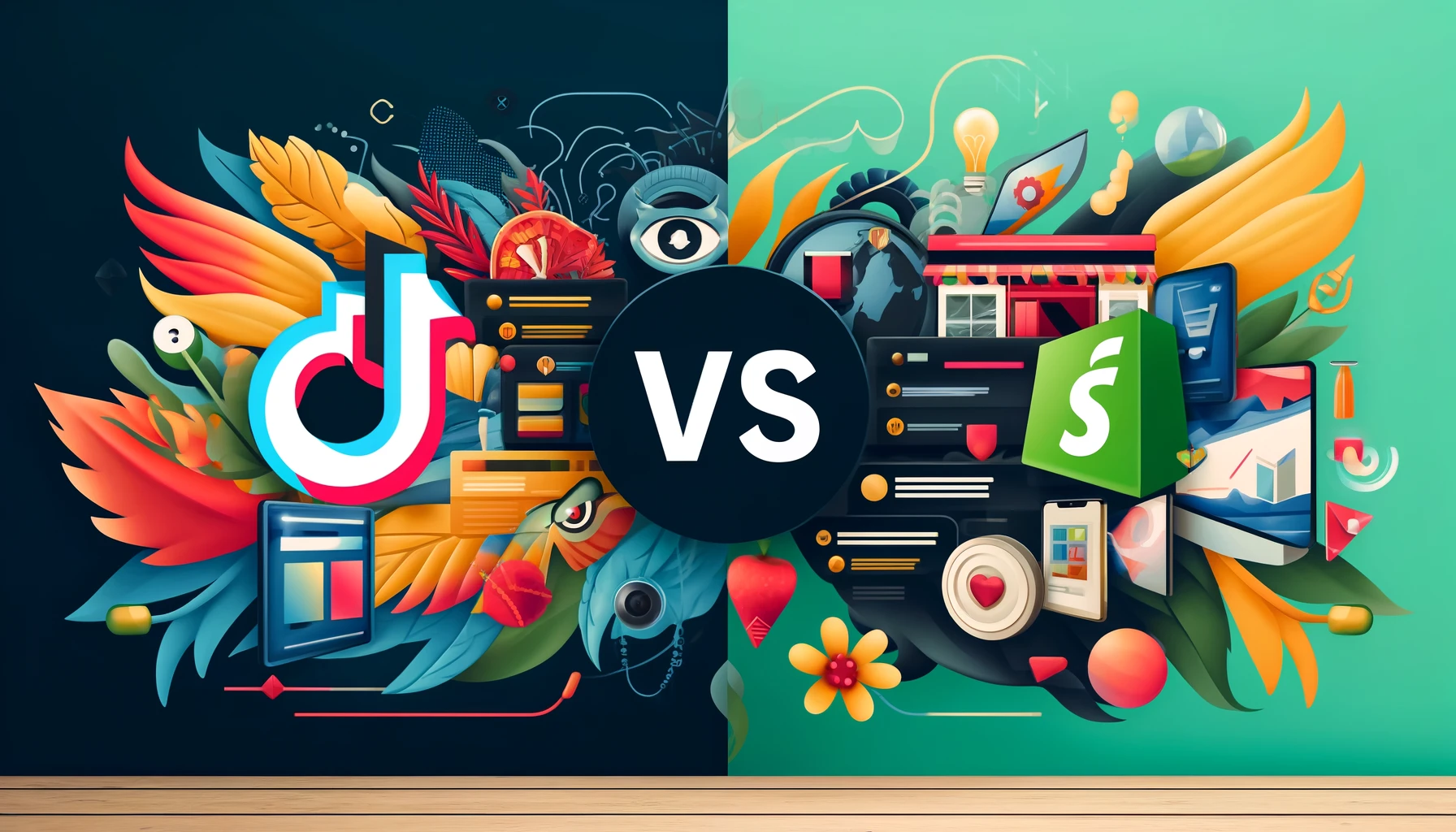
TikTok Shop is a platform integrated within TikTok. This allows businesses to sell products through the app. It also leverages TikTok's algorithm to promote products based on user interests and behaviors. Thus, enabling in-app purchases for a seamless shopping experience. On the other hand, Shopify is a standalone e-commerce platform that allows businesses to create customized online stores. It integrates with various sales channels, including TikTok, Instagram, Facebook, and Amazon, enabling businesses to manage multiple sales channels from a single dashboard.
You can use TikTok Shop and Shopify together for your business. TikTok Shop can be integrated into your Shopify store, allowing you to manage your inventory and orders across both platforms efficiently, expanding your reach and potentially increasing sales through social commerce.
TikTok Shop
TikTok Shop is a feature in the TikTok app that lets businesses sell products directly to users within the app.
Primarily targets the Gen Z and Millennial demographics who are active on TikTok.
Products can go viral quickly on TikTok, for both organic and paid content.
It's new and might have fewer features than older e-commerce platforms. It also depends a lot on TikTok's users.
Shopify
A standalone e-commerce platform offers businesses the tools to create and run their own online stores.
Broad target audience, suitable for businesses of all sizes across different industries.
Products are found through the business's marketing, SEO, and connections with other platforms.
Provides customizable storefronts, inventory management, shipping solutions, and third-party app integrations.
A Reddit discussion about TikTok Shop versus Shopify revolves around whether TikTok Shop can become a significant competitor to established e-commerce platforms like Shopify.

A user mentioned that TikTok Shop helps small businesses. But isn't a direct competitor to Shopify. It's more like a rival to Etsy, eBay, Facebook Marketplace, and Instagram Shop.

Another user believes that TikTok Shop, in its current state, doesn't match the comprehensive e-commerce solutions offered by Shopify, WooCommerce, or Magento. They suggest that TikTok would need to enhance its shopping experience and take over the role of a content management system (CMS) before it could challenge Shopify's market.

In addition, the rise of TikTok Shop has detracted from the platform's original appeal, which centered around entertainment and short, engaging videos. They feel that the influx of shopping options on TikTok has become intrusive. This is because users visit the app for entertainment rather than shopping.

In this article, we will explore the differences between TikTok Shop and Shopify to determine which platform is best for starting your business.
TikTok Shop vs Shopify
FEATURES
TikTok Shop
Instagram Shop
Overall Rating
Generally positive reviews, particularly for its seamless integration with the TikTok platform. Ratings vary but are often around 4.0/5.
Highly regarded with consistently high ratings, often around 4.8/5, praised for its robust features and flexibility.
Ease-of-Use
Easy to use for those familiar with TikTok, with a straightforward setup process within the app.
Known for its user-friendly interface, suitable for both beginners and advanced users.
Customer Support
Limited customer support, mostly online resources and in-app support. Users report mixed experiences.
Excellent customer support with 24/7 availability via phone, email, and chat. Extensive documentation and community forums.
Primary Audience
Primarily Gen Z and Millennials who are active on TikTok.
Broad audience, including small to large businesses across various industries.
Market Reach
Strong reach among TikTok users, particularly in regions where TikTok is popular.
Global reach with a presence in almost every country and market.
Ease of Setup
Very easy setup for existing TikTok users, can be done within minutes.
Simple setup process with guided steps, but may take longer due to more extensive customization options.
Sales & Marketing Tools
Integrated with TikTok's social commerce features, including shoppable videos and live streams.
Extensive range of built-in sales and marketing tools, plus thousands of third-party apps.
Product Types
Suitable for physical products that appeal to TikTok's demographic.
Supports a wide range of product types, including physical, digital, and services.
Cost Structure
Generally low-cost entry with transaction fees; specific costs can vary.
Monthly subscription fees ranging from $29 to $299, plus transaction fees unless using Shopify Payments.
Scalability
Good for small to medium-sized businesses; scalability can be limited by the platform's reach.
Highly scalable, suitable for small businesses to large enterprises with its Shopify Plus plan.
Support and Resources
Limited resources compared to Shopify, but offers in-app guidance.
Extensive resources, including a comprehensive knowledge base, webinars, and community forums.
Customization Option
The customization options for TikTok Shop are limited compared to traditional e-commerce platforms.
Highly customizable with a vast range of themes and the ability to edit code.
Product Listing and Catalog management
Basic product listing features integrated with TikTok content.
Advanced product listing and catalog management features, supporting large inventories.
Fulfillment and Order Processing
Basic fulfillment features, often reliant on third-party services.
Robust fulfillment and order processing options, including Shopify Fulfillment Network.
Payment Processing
Supports popular payment methods but may be limited in some regions.
Extensive payment processing options, including Shopify Payments, PayPal, and third-party gateways.
Integration with Other Platforms
Limited integration options, primarily focused on social media and e-commerce within TikTok.
Extensive integration options with various third-party apps, social media platforms, and other e-commerce tools.
TikTok Shop VS Shopify: Pros and Cons
TikTok Shop Pros and Cons
Pros
TikTok's large user base offers businesses access to a wide audience.
The platform's video format helps create engaging content that captures users' attention better than images or text.
TikTok Shop lets users discover, browse, and buy products directly within the app.
Businesses can use influencers to promote their products, gaining from the influencers' trust and large follower base.
TikTok's focus on trends helps businesses get noticed by taking advantage of viral content.
Cons
TikTok content doesn't last long, so businesses need to keep making new, interesting posts to stay visible.
TikTok’s algorithm affects visibility and can be unpredictable. So, strategies need frequent changes.
Businesses need to understand its unique culture, trends, and content style. This can be hard for newcomers.
There’s a risk of negative feedback or viral backlash on TikTok, which can hurt a brand’s reputation.
TikTok Shop lets users shop. But turning viewers into buyers is hard if the content doesn't connect with them.
Shopify Pros and Cons
Pros
Shopify is user-friendly and doesn't require extensive technical skills. The interface is intuitive, making it easy for beginners to set up and manage their stores.
Shopify offers a wide range of customizable templates. Users can personalize their stores to fit their brand aesthetics.
The Shopify app store has many plugins for marketing, inventory, and customer service.
Shopify Payments is built-in, but it also supports numerous other payment gateways. This flexibility is beneficial for businesses operating in different regions.
Shopify can accommodate small businesses and large enterprises alike. It offers various plans and features that can grow with your business.
Cons
Shopify can be expensive, especially for small businesses or startups. There are monthly fees, and additional costs can add up with apps and premium themes.
Using a non-Shopify payment gateway adds extra fees.
Shopify offers many customization options. But some parts are inflexible without coding skills or a developer.
Shopify's blogging tools aren't as strong as WordPress.
Shopify supports many currencies. But setting up international stores with different languages and currencies can be complex. New businesses might need extra apps.
TikTok Shop vs Shopify on Reddit
Why You Should Start Selling on TikTok Shop
A Reddit discussion says TikTok Shop is great for sellers in 2023. Only UK and US sellers can officially join, but some Asian sellers find workarounds. TikTok is pushing its shop by covering discounts and fees, attracting buyers and sellers. The algorithm favors TikTok Shop content. It's new but expected to get competitive soon.
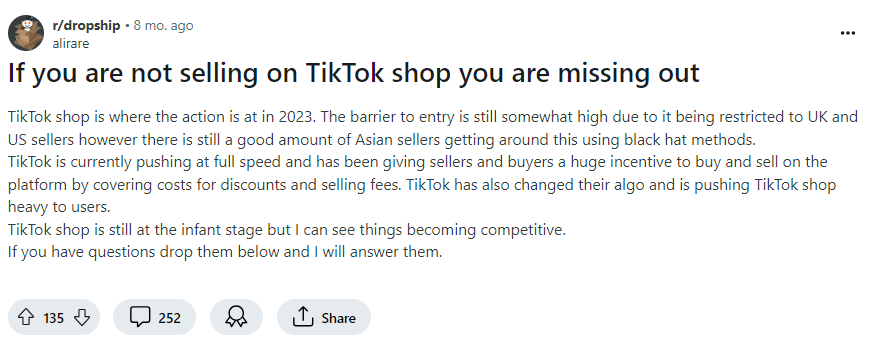
Switching to TikTok Shop for Larger Margins
A Reddit user discussed why they switched from Shopify to TikTok Shop.
- Higher Margins on TikTok Shop:The user moved to TikTok Shop for better profit margins. On Shopify, their margins were only 10-25% because of high advertising and shipping costs.
- Lower Costs on TikTok Shop: TikTok Shop gives better profits because TikTok pays for shipping. This lowers costs for sellers.
- Better Conversion Rates: TikTok Shop has higher conversion rates. So more visitors buy compared to Shopify.

TikTok Shop vs Shopify on YouTube
Shipbob compares TikTok Shop and Shopify on YouTube. TikTok Shop, launched in September 2023, lets merchants sell directly on TikTok using its large user base and high engagement. It usually has lower order values than Shopify but higher conversion rates, especially during live TikTok shopping.
Setting up a TikTok Shop is as easy as Shopify. Merchants can sell through live shopping, shoppable videos, and store pages. TikTok Shop's built-in audience and free reach help engage buyers and drive impulse purchases. For instance, a merchant with no followers made $20,000 in sales in two months by going live often, showing the platform's potential for fast growth and customer acquisition.
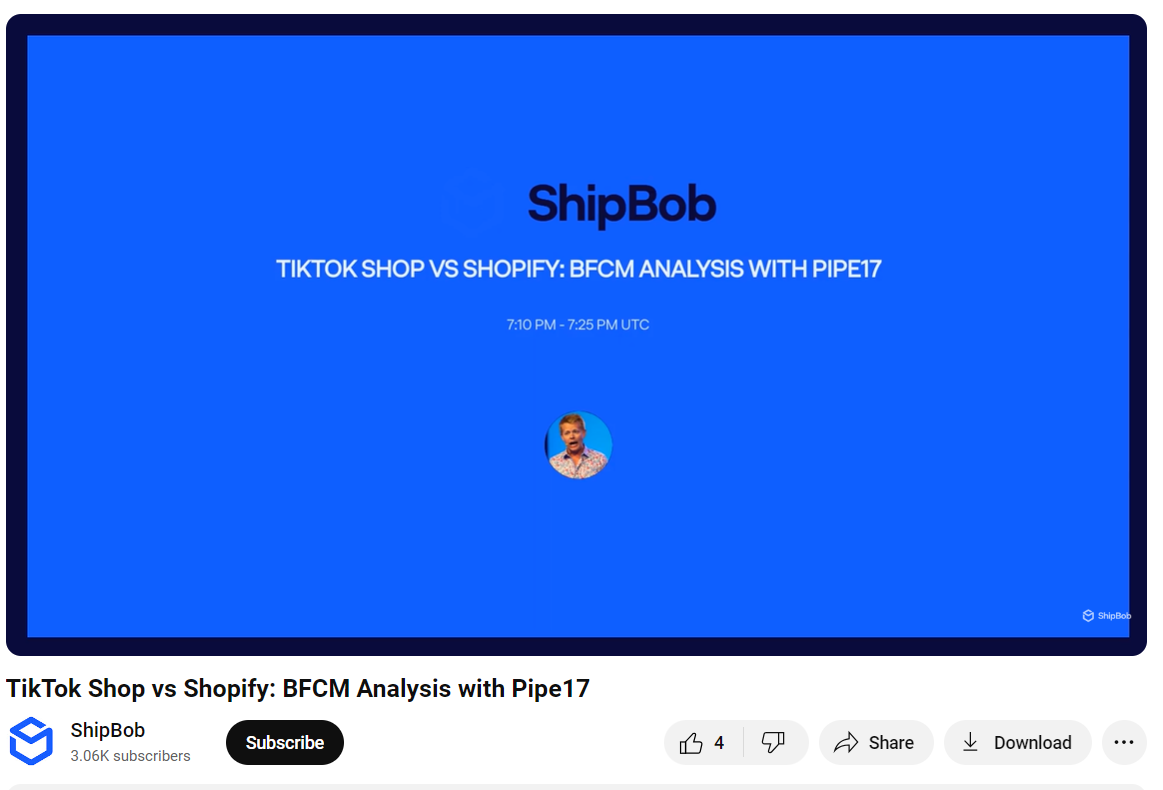
A YouTube video compares TikTok Shop and Shopify for small businesses. TikTok Shop has no monthly fees, easy affiliate marketing, live streaming for customer engagement, and better brand awareness. While drawbacks of TikTok Shop include a 5% sales commission, delayed payouts, limited customer data, and restricted communication during live streams. Shopify offers flexible payouts, detailed customer data, and real-time analytics, making it a strong base for e-commerce.
The speaker's suggestion is to use Shopify as the main platform and add TikTok Shop for extra exposure and live selling. Using both maximizes benefits and reduces limitations.
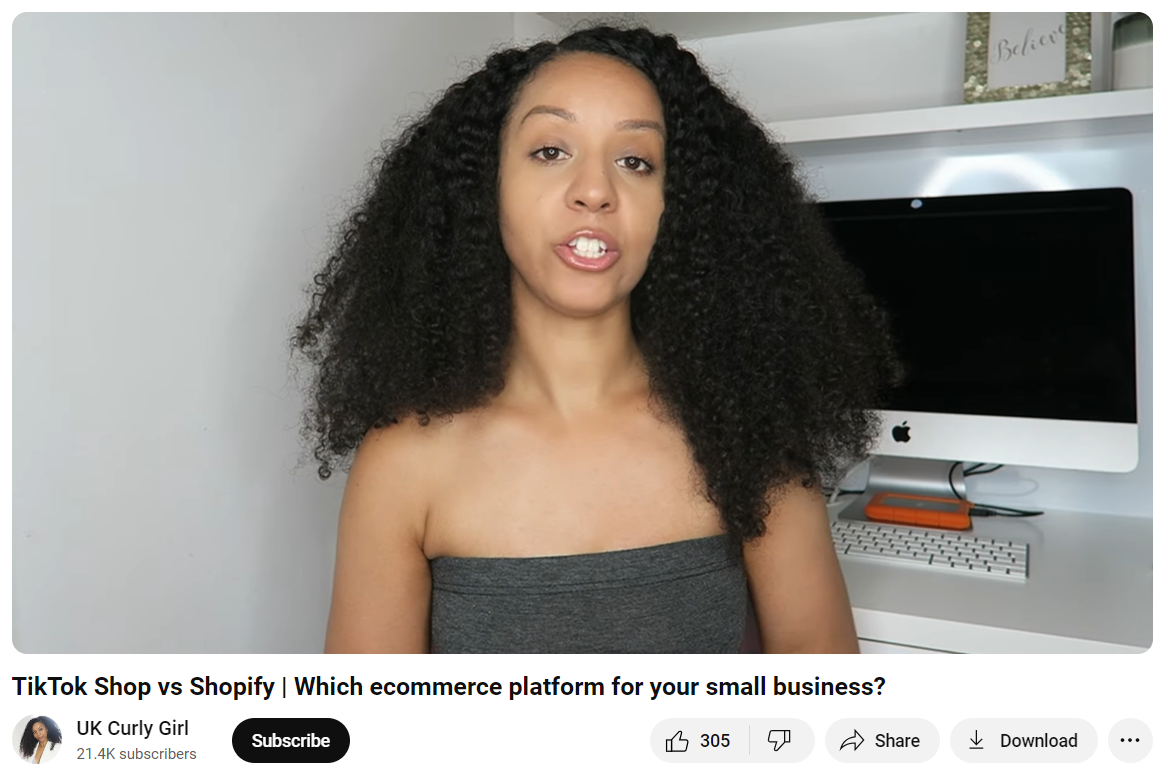
TikTok Shop vs Shopify: Which Is More Worth It?
Selling on TikTok Shop is more worth it for businesses looking to reach a young, engaged audience. While selling on Shopify can be worth it for many entrepreneurs, especially for those interested in dropshipping.
TikTok had over 1 billion monthly active users worldwide, with the majority being Gen Z and Millennials. Moreover, Social Pilot statistics shows that TikTok's advertising revenue in a year soared by a whopping 200% compared to the previous year.
On the other hand, Shopify provides a platform for setting up an online store easily. It has customizable templates and various tools for managing inventory, orders, and payments.
As of 2020, Shopify hosted millions of businesses worldwide. This indicates a thriving platform for entrepreneurs aiming for e-commerce success.
Is TikTok Dropshipping Profitable in 2024?
Yes, TikTok dropshipping can still be profitable in 2024. But success depends on various factors including product selection, marketing strategies, and platform algorithm changes.
In a YouTube video, Patryk Marketer discusses key insights for drop shipping on TikTok Shop. He also focused on the popularity of phone cases among TikTok users. He also highlights the challenges posed by TikTok's strict violation point system. This can lead to account bans. The speaker advises caution when using Amazon as a supplier due to potential account shutdowns. He suggests using burner accounts as a workaround.
Live streaming is also noted as an effective strategy for driving sales. This is despite requiring initial product purchases. However, TikTok Shop's fees are increasing from 2% to 8% in the coming months. Yet still competitive compared to other platforms. Finally, the speaker stresses the importance of careful inventory management to avoid listing prohibited items and sticking to safe, unbranded products.

Is Shopify Dropshipping Still Profitable in 2024?
Yes, Shopify dropshipping remains profitable in 2024. But its success hinges on several factors. This involves market trends, product selection, competition, and marketing strategies. Data indicates that e-commerce continues to grow by 2024. Shopify's user-friendly platform, different features, and extensive app ecosystem make it a popular choice for dropshippers.
The Ecom King on YouTube, demonstrated that dropshipping is far from dead. This is after generating $400,000 in 30 days through a Shopify dropshipping store. The store alone accounted for $385,000 and boasting a conversion rate of 3.08%. This surpasses industry standards. He highlighted that success was due to an effective website layout and strategic marketing creatives.
The primary marketing tool he used was Facebook ads. This involved precise audience targeting, strategic ad positioning, and experimenting. Plus, with many offer variations to identify the most effective ones. He also emphasized the role of compelling offers and high-quality creatives in these ads. You need to use various formats and capitalizing on promotional events like Black Friday and Cyber Monday.

TikTok Shop VS Shopify FAQs
What Are The Marketing Capabilities of TikTok Shop Compared to Shopify?
The marketing capabilities of TikTok Shop is it offers integrated social commerce capabilities. It also utilizes TikTok's algorithm for personalized recommendations and viral marketing. This enables businesses to reach a broad audience.
In contrast, the marketing capabilities of Shopify is its e-commerce tools for different uses. This include store customization, inventory management, and multi-channel sales. it also involves social media platform integrations. However, it relies on external marketing efforts and third-party apps for social media engagement and traffic generation. Thus, it lacks virality and direct content-driven sales approach of TikTok Shop
What Are the Inventory Management Capabilities of TikTok Shop Compared to Shopify?
The inventory management capabilities of TikTok Shop involves directly through the platform's seller tools. TikTok Shop offers basic inventory management through its seller tools. This allows sellers to list products, track sales, and manage stock levels.
The inventory management capabilities of Shopify provides more advanced inventory management tools. This include tracking inventory across multiple locations, automated low-stock alerts, and inventory transfers. Shopify also integrates with third-party apps for advanced features. Some of the examples include demand forecasting, batch tracking, and detailed inventory reports.
How Does the Product Discovery and Recommendation System on TikTok Shop Compare to that of Shopify?
The product discovery and recommendation system on TikTok Shop leverages the platform's advanced algorithm. This analyzes user behavior, preferences, and interactions to personalize recommendations. TikTok's algorithm excels at predicting user interests based on engagement with content. These include videos, likes, comments, and shares, leading to highly tailored product suggestions. Hence, it creates a seamless shopping experience where users discover products through their content feed.
In contrast, Shopify relies on its merchants to create personalized experiences. It can be through apps or integrations available on its platform. Shopify provides tools and apps that enable merchants to implement recommendation systems. It is often powered by machine learning and AI. This is to offer personalized product suggestions based on user browsing history and purchase behavior. The effectiveness of these recommendations can vary. It depends on the quality of the third-party apps used by merchants.
How Does the Customer Support of TikTok Shop Compare to That of Shopify?
The customer support of TikTok Shop is less established compared to Shopify. Shopify offers comprehensive support. That includes 24/7 phone, email, and live chat assistance. They also offer extensive resources such as community forums, help centers, and detailed documentation. TikTok Shop's support is evolving, primarily offering support through email and an online help center. It also has a growing community forum. While TikTok Shop is improving its customer service, Shopify remains more accessible for immediate assistance.
TikTok Shop VS Shopify: Real-Life Testimonials
TikTok Shop Real-Life Testimonials
An honest review from Mr. Money YouTube channel discusses TikTok Shop offering a seamless and effective way for businesses to sell products directly through TikTok by integrating shop buttons in videos. As a result, it reduces friction and increases sales. It can be easily connected to Shopify stores, with extensive support available through TikTok's business help center and TikTok Shop Academy.
According to the speaker, successful selling on TikTok involves a mix of entertaining and promotional content. This is often partnering with niche creators for better engagement. TikTok Shop provides analytics and a Creator Marketplace to help businesses find and partner with influencers. The platform's user-friendly design and focus on instant purchases. This caters especially to younger generations and driving higher conversion rates and sales.
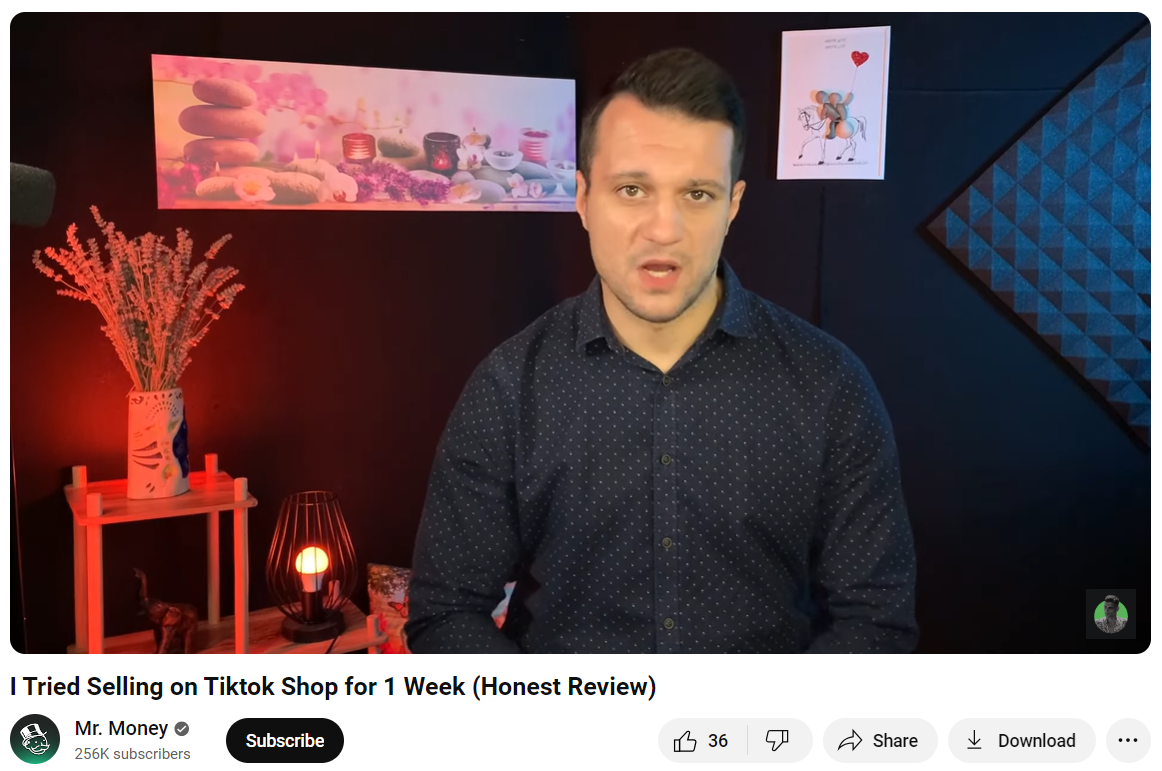
Another Reddit testimonial shared their negative experience as a seller on TikTok Shop. They advise against using it unless you own your warehouse. Their shop got banned without explanation. And customer service was unhelpful, merely following scripted responses. They faced many issues. This include syncing problems with Shopify and unwanted products appearing in their store. An AI system handled their appeals, which often declined them without proper review. They felt customer support were dishonest and the platform had too many glitches. They realize it is not worth the time. They recommended using TikTok only for making videos, not for selling products.
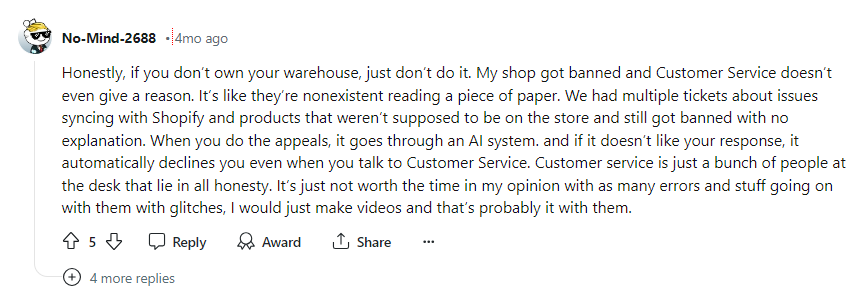
Shopify Real-Life Testimonials
Nathan Nazareth, a young entrepreneur from Vancouver, initially believed Shopify dropshipping was a scam. He decided to give it a try despite having no experience or money. he is inspired by successful YouTube creators. His first attempt, selling resistance bands, failed and cost him $400. However, his first sale motivated him to keep going. He eventually found a winning product that brought significant profits. This is through persistent effort and learning from his mistakes,
Despite reaching $5,000 days, his business faced setbacks due to long shipping times. Also, included other issues, leading to a difficult period. Nathan eventually regrouped, applied his lessons, and now runs three successful e-commerce brands generating over $100,000 per month in profit. He shares his journey on YouTube and social media to inspire others.

A Reddit user reported a negative experience with Shopify. They received a Shopify debit card but couldn't use it despite generating over $2,000 in sales. Setting up their store was confusing, and support was hard to access. After enabling Shopify payments, two days before their first payout, they were notified that their payments were on hold due to bank account verification. They faced delays and inconsistent responses, leaving them without access to funds. It is revealed this issue is common. This is because Shopify often holding payments without clear reasons. They decided to switched platforms and now warn others about Shopify's practices. They emphasized the impact on small businesses and expressed frustration at the lack of transparency and communication. They plan to continue sharing their story until the issue is resolved.
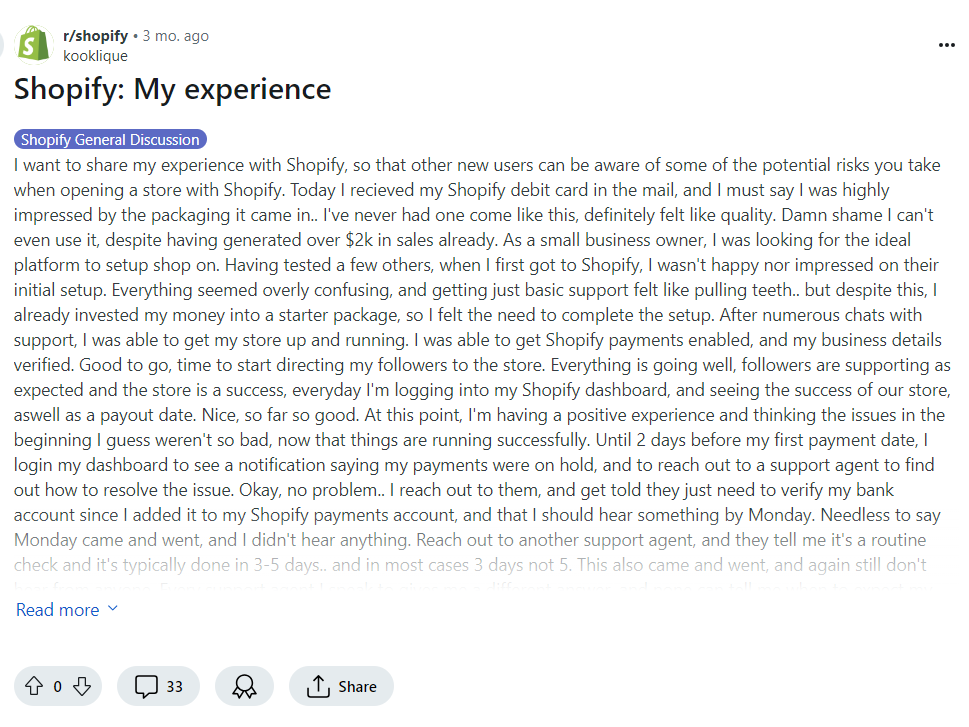
Why Local Lead Gen Biz Is The Faster Path For Passive Income?
Local lead generation businesses can provide a faster path to passive income. This is due to lower startup costs, quicker client acquisition, and recurring revenue from local businesses in need of consistent leads. Unlike TikTok Shop and Shopify platforms, local lead gen focuses on generating and selling leads. It often involves simpler operations.
When comparing TikTok Shop and Shopify, it's essential to consider the business model. TikTok Shop offers direct access to a large audience through social media, which can accelerate brand awareness and customer acquisition. Shopify, on the other hand, provides an e-commerce platform with extensive customization options and third-party integrations but requires more initial setup and ongoing management.
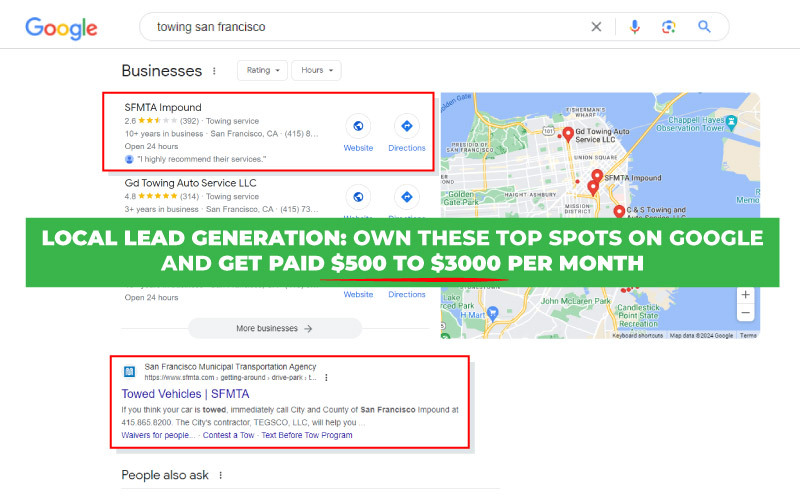
For anyone seeking passive income, local lead generation present fewer barriers to entry and faster returns. In contrast, choosing between TikTok Shop and Shopify for e-commerce should depend on your ability to leverage TikTok’s social commerce capabilities versus Shopify’s comprehensive e-commerce tools.



